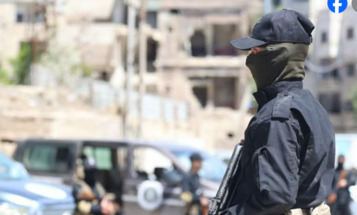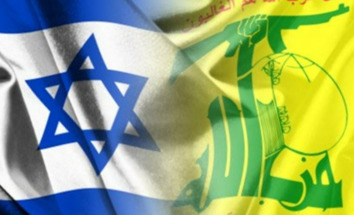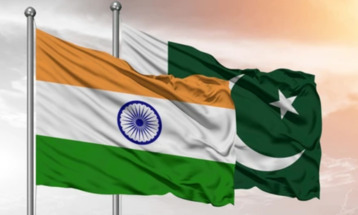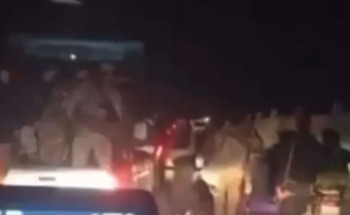-
US Aircraft Land in Hasaka... and "Jia Kurd" Confirms the Need to Review the Constitutional Declaration
-
The coincidence of US military movement with the controversy over the formation of the new Syrian government points to the complications of the Syrian scene, while the Autonomous Administration demand
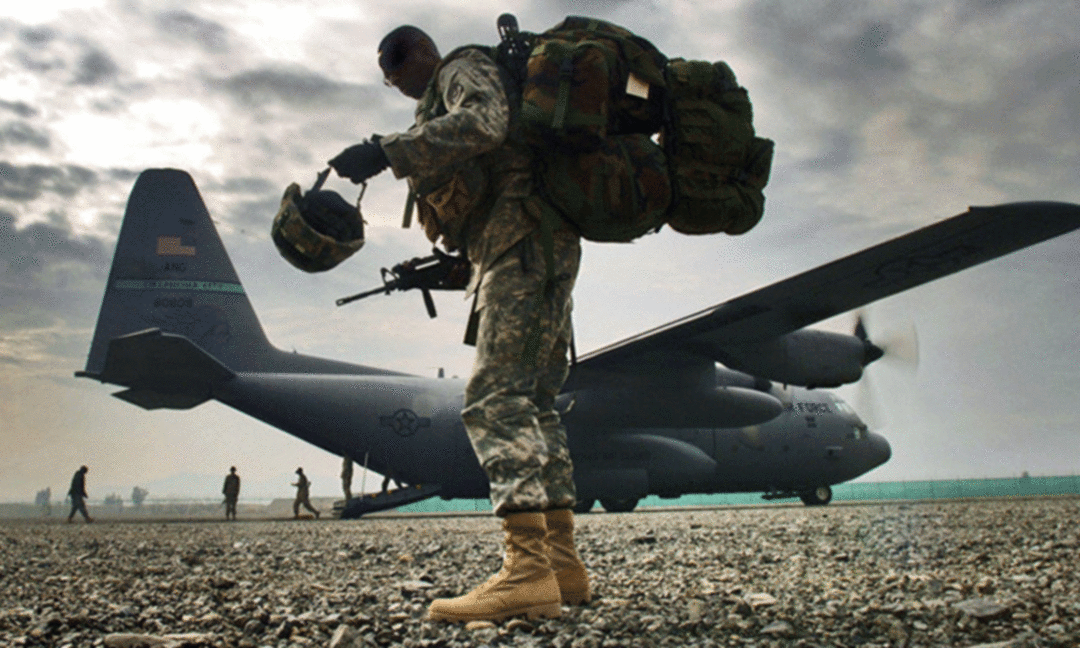
Hasaka governorate in northeastern Syria witnessed notable military activity represented by the landing of a US cargo plane loaded with logistical and military equipment at Gweiran base, as part of the "International Coalition" forces' strategy to strengthen their positions in areas east of the Euphrates.
This coincided with the sighting of another US cargo plane carrying advanced equipment landing at "Kharab Al-Jeer" base in the countryside of Malikiyah north of Hasaka, amid intensified aerial flights of warplanes over the area to ensure the security of the landing operation, reflecting continued American interest in strengthening military presence in the region.
This increasing military activity comes amid a wide political debate about the formation of the new Syrian government, which has sparked varied reactions, most notably the position of the Autonomous Administration, which considered that the government formation does not reflect political diversity and true representation of Syrian society components.
Badran Jia Kurd, a leader in the Autonomous Administration, noted in special statements to the Syrian Observatory for Human Rights that "Syrians waited for the formation of the new interim government and hoped it would be different from previous governments in Syria during the Ba'ath Party rule as well as the outgoing caretaker government."
Jia Kurd added: "But this government did not fulfill the desired hopes of forming a government inclusive of Syrians and representative of everyone according to the current political and field map, so the Autonomous Administration criticized its formation mechanism and its results."
He pointed out that the new government, consisting of 22 ministerial portfolios, had the majority of its portfolios, especially sovereign ones, go to one component and one party, without considering the political, national, and religious diversity and differences in the country, raising questions about the future of political representation for different components.
Jia Kurd expressed concern about the absence of real representation for the majority of Syrian society groups in the new government, pointing to the absence of Kurdish political forces and weak representation of Alawites and Druze, as well as limiting sovereign ministerial portfolios to figures close to Hayat Tahrir al-Sham.
The Kurdish leader warned: "Of course, continuing the approach of monopolizing powers and excluding others will pose a direct threat to the political process in the country that we look forward to, but we will wait for the actions of this government."
He continued: "If it is unable to change its view of Syria's future and limit its performance to serving one color and one party, this will undoubtedly mark the beginning of reproducing the previous regime but with a religious tinge, and then we will not be bound by its decisions or laws."
Regarding the constitutional declaration, which is still a subject of wide debate, Jia Kurd confirmed that it was disappointing and did not live up to the goals of the Syrian revolution, saying: "The rights of different components and peoples including Kurds, Druze, Syriacs, Assyrians, and others were not addressed."
He pointed out that the constitutional declaration did not align with the agreement signed between north and east Syria and the Syrian authority, especially the clause related to the specificity of the Kurdish component and the need to guarantee the rights of Kurds and other components in the new Syrian constitution.
He emphasized that "reviewing the formulation of the constitutional declaration has become necessary to involve all components so that we do not return to the previous era," adding that the Autonomous Administration is ready for dialogue and finding common ground among Syrians according to national foundations that lead to building a pluralistic, decentralized political system.
Jia Kurd revealed that a joint Kurdish delegation will head to Damascus in the near future to discuss the Kurdish issue, expecting that "these discussions and dialogues will lead to amending the constitutional declaration and including the rights of the Kurdish people within it."
Regarding the Al-Hol camp file, which is one of the most prominent security challenges in the region, the leader explained that it is a file related to combating terrorism and requires integrated solutions from the international community in partnership with the administration of the north and east Syria region, ruling out the possibility of resolving it in the near future.
He confirmed that "the Syrian Democratic Forces, as a reliable military force and partner of the international coalition against ISIS, will continue to manage this sensitive file despite its complications," pointing to the Autonomous Administration's efforts to propose some solutions, such as allowing Syrians wishing to return to their areas to leave the camp.
You May Also Like
Popular Posts
Caricature
BENEFIT Sponsors BuildHer...
- April 23, 2025
BENEFIT, the Kingdom’s innovator and leading company in Fintech and electronic financial transactions service, has sponsored the BuildHer CityHack 2025 Hackathon, a two-day event spearheaded by the College of Engineering and Technology at the Royal University for Women (RUW).
Aimed at secondary school students, the event brought together a distinguished group of academic professionals and technology experts to mentor and inspire young participants.
More than 100 high school students from across the Kingdom of Bahrain took part in the hackathon, which featured an intensive programme of training workshops and hands-on sessions. These activities were tailored to enhance participants’ critical thinking, collaborative problem-solving, and team-building capabilities, while also encouraging the development of practical and sustainable solutions to contemporary challenges using modern technological tools.
BENEFIT’s Chief Executive Mr. Abdulwahed AlJanahi, commented: “Our support for this educational hackathon reflects our long-term strategic vision to nurture the talents of emerging national youth and empower the next generation of accomplished female leaders in technology. By fostering creativity and innovation, we aim to contribute meaningfully to Bahrain’s comprehensive development goals and align with the aspirations outlined in the Kingdom’s Vision 2030—an ambition in which BENEFIT plays a central role.”
Professor Riyadh Yousif Hamzah, President of the Royal University for Women, commented: “This initiative reflects our commitment to advancing women in STEM fields. We're cultivating a generation of creative, solution-driven female leaders who will drive national development. Our partnership with BENEFIT exemplifies the powerful synergy between academia and private sector in supporting educational innovation.”
Hanan Abdulla Hasan, Senior Manager, PR & Communication at BENEFIT, said: “We are honoured to collaborate with RUW in supporting this remarkable technology-focused event. It highlights our commitment to social responsibility, and our ongoing efforts to enhance the digital and innovation capabilities of young Bahraini women and foster their ability to harness technological tools in the service of a smarter, more sustainable future.”
For his part, Dr. Humam ElAgha, Acting Dean of the College of Engineering and Technology at the University, said: “BuildHer CityHack 2025 embodies our hands-on approach to education. By tackling real-world problems through creative thinking and sustainable solutions, we're preparing women to thrive in the knowledge economy – a cornerstone of the University's vision.”
opinion
Report
ads
Newsletter
Subscribe to our mailing list to get the new updates!


